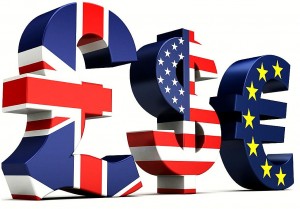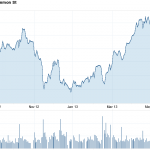 British pound traded close to 11-week lows against the euro on Monday on speculation that Bank of England will stick to its current stimulus policy.
British pound traded close to 11-week lows against the euro on Monday on speculation that Bank of England will stick to its current stimulus policy.
EUR/GBP pair hit a session high at 0.8621 earlier, after which consolidation followed at 0.8615. On July 4th the pair slid to 0.8633, the lowest point since April 17th.
“The Bank of England want to keep a cautious outlook and that should keep the pound on the back foot,” said John Hardy, head of foreign-exchange strategy at Saxo Bank A/S in London, cited by Bloomberg. “If the data begins to turn the wrong way again you have a compelling case for more pound weakness.”, he also added.
On July 4th Bank of England’s Monetary Policy Committee put its base interest rate on hold at a record low 0.50% and the targeted level of asset purchases at 375 billion GBP. Pound reacted with a sharp decline against the US dollar on July 3rd after it was announced that monetary policy was not to be tightened as soon as most investors had expected, because economic indicators were still not convincing enough.
The pound has declined 2% this year, according to Bloomberg Correlation-Weighted Indexes, that track 10 developed-nation currencies. US dollar has gained 7.9%, while the euro strengthened 4.9%.
UK economy could be in line for a period of “strong catch-up growth” once it gets through the current weakness, according to Capital Economics Ltd., Bloomberg imparted. The company also cited that the potential impact of Mark Carney, who started his role as Bank of England governor on July 1, “could trigger more support from monetary policy.”
Additionally, both business confidence and output in the United Kingdom climbed to 13-month highs in June, BDO LLP reported on Monday. The sentiment index advanced for a fifth month to 94.3 in June from 93.6 in May, while output index increased to 94.9 from 94.4. However, both indicators still remained below 95.0, a reading that separates growth from decline.
Meanwhile, earlier today it became clear that industrial production in Germany decreased at the fastest pace in May, boosting fears over euro zone debt crisis impact on German economy. Industrial production dropped by 1.0% in May on annual basis, mismatching preliminary estimates that the indicator will decline by 0.5%. Aprils data was revised down to a 0.9% rise from 1.0% previously. Despite disappointing industrial activity in euro regions largest economy, the euro continued its upward movement against the US dollar and the sterling.





